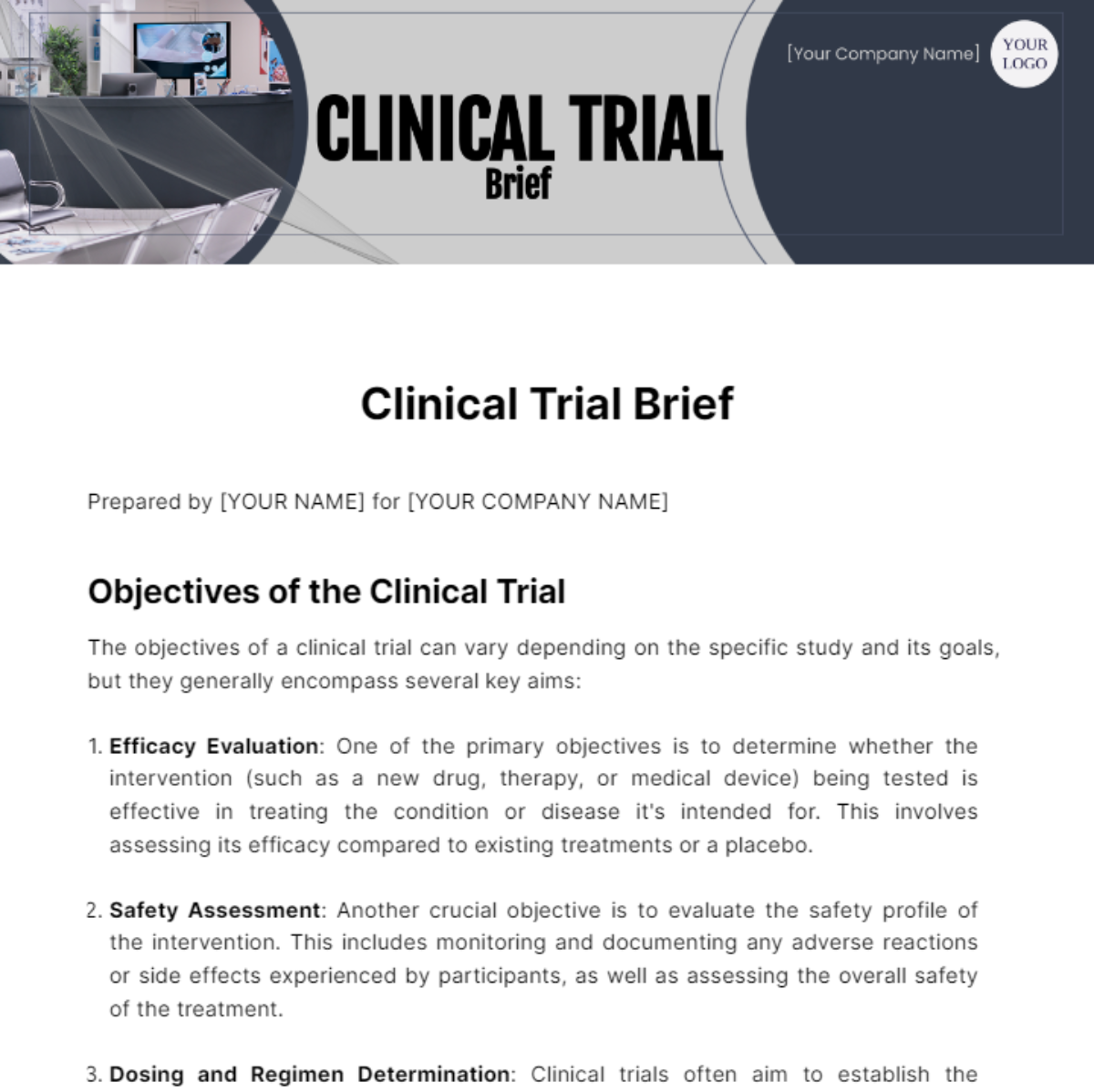Free Clinical Trial Brief

Prepared by [YOUR NAME] for [YOUR COMPANY NAME]
Objectives of the Clinical Trial
The objectives of a clinical trial can vary depending on the specific study and its goals, but they generally encompass several key aims:
Efficacy Evaluation: One of the primary objectives is to determine whether the intervention (such as a new drug, therapy, or medical device) being tested is effective in treating the condition or disease it's intended for. This involves assessing its efficacy compared to existing treatments or a placebo.
Safety Assessment: Another crucial objective is to evaluate the safety profile of the intervention. This includes monitoring and documenting any adverse reactions or side effects experienced by participants, as well as assessing the overall safety of the treatment.
Dosing and Regimen Determination: Clinical trials often aim to establish the optimal dosage and treatment regimen for the intervention being studied. This involves assessing different dosages or administration schedules to determine the most effective and safe approach.
Comparative Effectiveness: In comparative trials, the objective is to compare the effectiveness of the intervention being studied with one or more existing treatments. This helps determine whether the new intervention offers advantages over current standards of care.
Exploratory Research: Some clinical trials have exploratory objectives aimed at gaining a better understanding of the disease or condition being studied, identifying potential biomarkers, or investigating underlying mechanisms of action.
Quality of Life Assessment: Many trials also include objectives related to assessing the impact of the intervention on participants' quality of life, such as improvements in symptoms, functional abilities, or overall well-being.
Long-term Outcomes: In some cases, the objective is to evaluate the long-term effects of the intervention, including its durability of response, potential for disease progression, and any delayed or latent effects.
Subgroup Analysis: Clinical trials may aim to identify specific subgroups of patients who may respond differently to the intervention based on factors such as age, gender, genetic markers, or disease severity.
Regulatory Approval: For trials conducted as part of the drug development process, the primary objective may be to generate data necessary for regulatory approval from agencies such as the FDA (Food and Drug Administration) or EMA (European Medicines Agency).
Cost-effectiveness Analysis: In addition to clinical outcomes, some trials include objectives related to assessing the cost-effectiveness of the intervention compared to existing treatments, considering factors such as healthcare resource utilization and long-term economic impact.
These objectives collectively aim to generate robust evidence regarding the safety, efficacy, and potential benefits of the intervention being studied, ultimately informing clinical practice, regulatory decisions, and patient care.
Methodology
The methodology of a clinical trial outlines the specific procedures, protocols, and approaches used to conduct the study and achieve its objectives. Here are some key components typically included in the methodology of a clinical trial:
Study Design: This describes the overall structure of the trial, including whether it is a randomized controlled trial, observational study, crossover study, or other design. The study design also specifies factors such as the treatment arms, allocation ratio, blinding (single-blind, double-blind, or open-label), and the duration of follow-up.
Participants: The methodology includes criteria for participant eligibility, such as age, gender, medical history, disease severity, and inclusion/exclusion criteria. It also outlines the recruitment process and methods used to obtain informed consent from participants.
Intervention: Details of the intervention being studied are provided, including the treatment regimen, dosage, route of administration, and any concomitant therapies or interventions. For drug trials, this may include information on the investigational product, including formulation and manufacturing details.
Comparator: If applicable, the methodology specifies the comparator(s) used in the trial, such as placebo, standard of care, or another active treatment. It outlines how participants are assigned to different treatment groups and any randomization procedures used to minimize bias.
Outcome Measures: The methodology defines the primary and secondary outcome measures used to assess the efficacy and safety of the intervention. This may include clinical endpoints, biomarkers, patient-reported outcomes, or other measures relevant to the study objectives.
Data Collection and Monitoring: Procedures for data collection, including the schedule of assessments, data sources (e.g., medical records, laboratory tests, patient surveys), and methods for data capture and management (e.g., electronic data capture systems). The methodology also describes any interim analyses, data monitoring committees, or safety monitoring plans in place to ensure participant safety and data integrity.
Statistical Analysis: The methodology outlines the statistical methods and analysis plan used to analyze the data collected during the trial. This includes sample size calculations, methods for handling missing data, statistical tests for comparing treatment groups, and strategies for controlling for confounding variables or biases.
Ethical Considerations: Details of ethical approval obtained from institutional review boards (IRBs) or ethics committees, as well as any regulatory approvals required to conduct the trial. The methodology also describes procedures for protecting participant confidentiality, ensuring voluntary participation, and addressing any potential conflicts of interest.
Timeline and Study Conduct: A timeline outlining the planned duration of the trial, including recruitment, follow-up, data analysis, and reporting of results. The methodology may also include details of the study's conduct, such as site selection, training of investigators, and procedures for monitoring adherence to the study protocol.
Dissemination of Results: Plans for disseminating the results of the trial, including publication in scientific journals, presentations at conferences, and sharing of data with regulatory agencies or other stakeholders. The methodology may also include provisions for data sharing and transparency to facilitate independent verification and further research.
Overall, the methodology provides a comprehensive blueprint for how the clinical trial will be conducted, ensuring that it is conducted in a rigorous, ethical, and scientifically valid manner.
Requirements for Participation
The requirements for participation in a clinical trial are established to ensure that participants meet specific criteria necessary for the study's objectives, safety, and validity. These criteria may vary depending on the nature of the trial, the condition being studied, and the characteristics of the intervention. Here are some common types of requirements for participation in clinical trials:
Inclusion Criteria: These are the characteristics that potential participants must have to be eligible for the trial. Common inclusion criteria include:
Age range: Some trials may target specific age groups, such as adults, children, or older adults.
Gender: Certain studies may focus on a particular gender or include both males and females.
Diagnosis: Participants must have a specific medical condition or diagnosis relevant to the study.
Disease severity: Trials may target participants with a particular stage or severity of the disease.
Previous treatments: Some trials may require participants to have undergone specific previous treatments or to be treatment-naïve.
Other medical conditions: Participants may need to meet certain criteria related to their overall health or medical history.
Exclusion Criteria: These are characteristics that disqualify individuals from participating in the trial. Common exclusion criteria include:
Presence of certain medical conditions: Participants with certain comorbidities or medical conditions that could interfere with the study outcomes may be excluded.
Pregnancy or breastfeeding: Trials involving medications or interventions that could pose risks to pregnant women or breastfeeding mothers may exclude these individuals.
Allergies or sensitivities: Participants with known allergies or sensitivities to study medications or components may be excluded.
Participation in other trials: Some trials may exclude individuals who are currently participating in other clinical trials to avoid confounding effects.
Substance abuse: Participants with a history of substance abuse or dependence may be excluded due to potential safety concerns or impact on study adherence.
Performance Status: Some trials assess participants' performance status or functional abilities to ensure they can comply with study procedures and assessments. This may include criteria related to mobility, cognitive function, or other functional measures.
Laboratory Parameters: Participants may need to meet specific laboratory criteria, such as certain levels of blood counts, liver function tests, or other biomarkers relevant to the study.
Psychosocial Factors: In some cases, trials may consider psychosocial factors such as mental health status, social support, or cognitive abilities to ensure participants can provide informed consent and adhere to study requirements.
Informed Consent: All participants must provide voluntary informed consent to participate in the trial. This includes understanding the purpose, procedures, risks, and benefits of the study and agreeing to comply with the study protocol.
Language and Communication: Participants may need to be fluent in the language(s) used for study assessments and communication with study personnel to ensure comprehension and adherence to study procedures.
These requirements are established to select participants who are most likely to benefit from the intervention being studied while minimizing risks and ensuring the integrity of the trial results. It's important for researchers to carefully consider and justify the criteria for participation based on the study objectives, population characteristics, and ethical considerations.
Data Analysis
Data analysis in a clinical trial involves processing, interpreting, and concluding the data collected during the study. The specific methods used for data analysis depend on the study design, objectives, outcome measures, and statistical considerations. Here are some key steps involved in data analysis for clinical trials:
Data Cleaning and Validation: Before analysis, the collected data undergoes cleaning and validation processes to identify and correct any errors, inconsistencies, or missing values. This ensures the accuracy and reliability of the data used for analysis.
Descriptive Statistics: Descriptive statistics are used to summarize and describe the characteristics of the study population, treatment groups, and outcome variables. This may include measures such as means, medians, standard deviations, frequencies, and proportions.
Inferential Statistics: Inferential statistics are used to make inferences or predictions about the study population based on the data collected from the sample. Common inferential techniques include hypothesis testing, confidence intervals, and regression analysis.
Comparative Analysis: For clinical trials comparing different treatments or interventions, comparative analysis methods are used to assess differences between treatment groups. This may involve comparing means, proportions, or other measures of effect size using appropriate statistical tests such as t-tests, chi-square tests, or analysis of variance (ANOVA).
Survival Analysis: In trials with time-to-event outcomes, such as disease progression or mortality, survival analysis techniques are used to analyze the timing of events and estimate survival probabilities over time. Kaplan-Meier curves and Cox proportional hazards models are commonly used for survival analysis.
Subgroup Analysis: Subgroup analysis involves examining treatment effects within specific subgroups of the study population, such as age, gender, disease severity, or genetic factors. This helps identify potential differences in treatment response and informs personalized medicine approaches.
Safety Analysis: Safety analysis focuses on evaluating the safety profile of the intervention by analyzing adverse events, serious adverse events, and other safety outcomes. This includes calculating incidence rates, comparing adverse event frequencies between treatment groups, and assessing the severity and causality of adverse events.
Quality of Life and Patient-Reported Outcomes: For trials assessing quality of life or patient-reported outcomes, analysis methods are used to evaluate changes in patient-reported measures over time and compare treatment groups. This may involve using validated instruments and statistical techniques such as analysis of covariance (ANCOVA) or mixed-effects models.
Missing Data Handling: Methods for handling missing data, such as imputation techniques or sensitivity analyses, are employed to address the impact of missing data on the study results and ensure the robustness of the findings.
Interpretation and Reporting: The results of the data analysis are interpreted in the context of the study objectives, hypothesis, and limitations. Findings are summarized in a comprehensive report, often including tables, figures, and statistical summaries, and are communicated to stakeholders through scientific publications, presentations, or regulatory submissions.
Throughout the data analysis process, it's essential to adhere to predefined analysis plans outlined in the study protocol and to conduct analyses in a transparent, unbiased, and statistically rigorous manner to ensure the validity and reliability of the study findings.
Ethical Considerations
Ethical considerations are paramount in clinical trials to ensure the protection, rights, and well-being of study participants. Here are some key ethical considerations that guide the conduct of clinical trials:
Informed Consent: Participants must provide voluntary, informed consent after receiving clear and understandable information about the study purpose, procedures, potential risks and benefits, and their rights as participants. Informed consent ensures that participants understand what their participation entails and can make an informed decision about whether to participate.
Beneficence and Non-maleficence: Researchers must maximize benefits to participants while minimizing harm. This involves designing studies with potential benefits to participants and society, ensuring participant safety through careful risk assessment and monitoring, and mitigating any potential harms associated with the study.
Respect for Autonomy: Participants have the right to self-determination and should be treated with respect for their individual preferences, values, and decisions regarding participation in the trial. This includes respecting participants' right to withdraw from the study at any time without penalty.
Equitable Participant Selection: Researchers should ensure that the selection of participants is fair and equitable, without unjust discrimination or bias based on factors such as race, ethnicity, gender, socioeconomic status, or disability.
Confidentiality and Privacy: Participants' privacy and confidentiality must be protected throughout the trial, including the collection, storage, and sharing of personal and health information. Researchers should implement safeguards to prevent unauthorized access to participant data and ensure that data are anonymized or de-identified whenever possible.
Independent Review and Oversight: Clinical trials should undergo ethical review and approval by institutional review boards (IRBs) or ethics committees composed of independent experts who assess the study's scientific validity, ethical soundness, and protection of participants' rights and welfare.
Transparency and Disclosure: Researchers must disclose relevant information about the study to participants, sponsors, regulatory authorities, and the public. This includes disclosing any conflicts of interest, financial relationships, or potential biases that may influence the conduct or reporting of the study.
Community Engagement and Collaboration: Researchers should engage with the communities affected by the research to ensure their concerns and perspectives are considered, and to foster trust and collaboration. This may involve community advisory boards, stakeholder consultations, and culturally sensitive approaches to recruitment and engagement.
Post-trial Access and Dissemination of Results: Participants have the right to access any benefits resulting from the trial, such as access to study interventions or follow-up care, once the trial is completed. Researchers also have an ethical obligation to disseminate study results promptly, regardless of the findings, to contribute to scientific knowledge and inform clinical practice.
Global Health Equity: In international trials, researchers should consider the principles of global health equity and ensure that the benefits and burdens of research are distributed fairly among participating communities, particularly in low-resource settings.
By adhering to these ethical principles and considerations, researchers can conduct clinical trials with integrity, trustworthiness, and respect for the rights and well-being of participants, ultimately advancing scientific knowledge and improving patient care.
Conclusion
In conclusion, ethical considerations are fundamental to the conduct of clinical trials, ensuring the protection, rights, and well-being of study participants. Through adherence to principles such as informed consent, beneficence, respect for autonomy, and equitable participant selection, researchers can uphold the highest standards of ethical conduct in research. Transparency, independent review, and community engagement further bolster trust and integrity in the research process.
Ethical conduct extends beyond the initial design and implementation of clinical trials to encompass ongoing monitoring, data analysis, and dissemination of results. Researchers have a responsibility to prioritize participant safety, privacy, and confidentiality throughout the trial and to communicate findings openly and transparently to stakeholders.
By integrating ethical considerations into every stage of the research process, from study design to publication, researchers uphold the values of integrity, respect, and justice in clinical research. This commitment not only ensures the validity and reliability of study findings but also fosters trust between researchers, participants, and the broader community, ultimately advancing scientific knowledge and improving patient care.
- 100% Customizable, free editor
- Access 1 Million+ Templates, photo’s & graphics
- Download or share as a template
- Click and replace photos, graphics, text, backgrounds
- Resize, crop, AI write & more
- Access advanced editor
Introducing the Clinical Trial Brief Template from Template.net – your indispensable tool for meticulous clinical trial planning. Customizable and editable, it simplifies outlining trial objectives, methodology, and participant criteria. Seamlessly editable in our Ai Editor Tool, ensuring precision and clarity in every detail. Elevate your clinical trial planning with this tool crafted to streamline organization and ensure regulatory compliance.





























